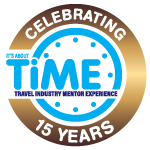By Cara Jenkins – Newscorp Australia
Without the support and guidance of others, Pip Marlow may never have stayed in the technology industry beyond a few years.
Navigating her way through the heavily male-dominated industry in the 1990s, she considered quitting Microsoft twice and now proclaims she “survived” the industry at the time, rather than “thrived” in it.
So Marlow, the chief executive at software company Salesforce Australia, New Zealand and ASEAN, is now a big advocate for mentoring, particularly those from non-traditional backgrounds in a given field, to ensure they do not walk alone.
“There were people who helped me get through a lot of rough experiences and challenges,” she says.
“I didn’t really think about them as mentors at the time, but that’s what they were.”
Pip Marlow had a challenging start to her career in the tech industry.
It aims to motivate women to navigate the digital landscape in new and innovative ways, particularly as technology touches more roles and careers than ever before and continues to open up new areas of opportunity.
LEARN FROM EXPERIENCE
Today’s women can gain from those who broke the glass ceiling before them by following in their footsteps.
But mentees can learn and gain support from anyone who has experience in anything they seek, whether it is to craft a certain career path, gain industry knowledge, or even improve soft skills such as confidence.
“(When I moved into financial services) I was deliberately looking for someone with capability and knowledge and experience that I didn’t have,” Marlow says.
“(A mentor) may be someone who is younger than me at a different career stage that can help me.
“I always look to hear from people who have a completely different lens and lived experience to me.”
For example, the first female on a particular board may want someone with that experience, or an individual moving into a manager role for the first time may want someone who has done the same thing.
Marlow has noticed an increase in people proactively seeking a mentor.
“People ask someone because of their title, such as CEO or chair,” she says.
“Before I say yes or no (to those who ask her), I ask them to tell me what you’re seeking from a mentor.”
They should also be mindful learning can come from all directions, she says.
She says, for example, her father was a great mentor for her when she was considering career shifts.
CHAMPION YOUR ABILITIES
Not having confidence in their own abilities, to put their hand up for opportunities, or to pursue new challenges is a typical trait of women.
So a mentor can act as a sponsor to put the mentee’s name forward for promotion, or provide the encouragement for them to do it themselves.
They also can help the mentee push through situations they may initially feel are too challenging.
“When I reflect on growing up in this industry, I needed some help to navigate and stay in it,” she says.
“If you’re going to realise your potential, you’re going to need people to help you.
“I have benefited greatly from having 1) people believing in me when I didn’t believe in myself; 2) to hold up a mirror to me when I needed a mirror held up to me; and 3) to sponsor me for opportunities that I didn’t know existed, or was in a situation where I wasn’t sponsoring myself.”
PROVIDE HELP IN RETURN
Mentoring does not just work with those who ask for it and may require mentors to make the approach.
“Early in my career, I didn’t seek out mentorship,” Marlow says.
“I didn’t really know what mentoring was, I wasn’t labelling it like that.”
She says the technology industry, in particular, needs more mentors to be proactive with females who are considering careers as well as early in their working lives to improve their workforce participation so it is equal to that of males.
“The higher you go up, the lower the representation (of women),” she says.
“We’re committed to pay equity, promotions, really pushing to do everything we can but we’ve got to be hiring in really well and at a focused rate to go from a third (of the workforce being women) to 50/50 – the pace of change isn’t fast enough.
“Organisations are doing things more and more – mentoring is one of them, but we still have to look at other systematic changes we need to do to encourage participation.
“We need to make sure women go through their education and are excited and see the potential around the roles that come from having STEM skills.”

